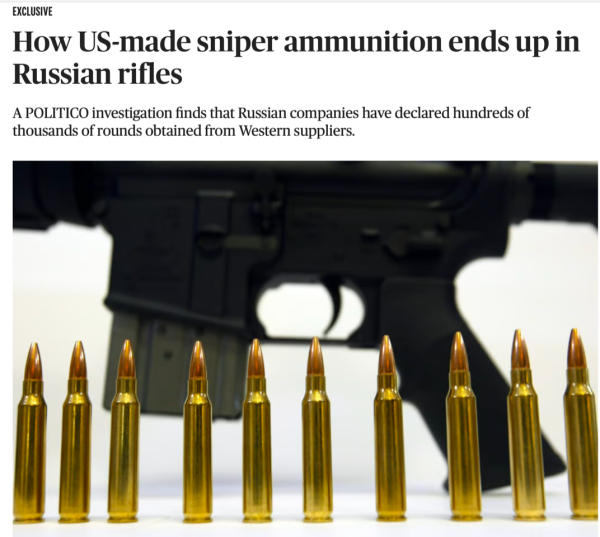Yesterday, I was notified that Hornady, an unapologetically American ammunition company, had been accused via a published report by POLITICO Europe of supplying Wagner, the surrogate Russian army, with ammunition.
As you can imagine, that kicked off quite a storm in Nebraska. Steve Hornady tells me, that Hornady is “absolutely, in no way, supplying any of their products to the Russians.”
“That they have them,” he said, “seems indisputable. But how they are getting them is unknown.”
The company, he told me, suspects a customer of the importers -“a consumer in other words” - is buying them and smuggling them out of the country(ies) they live in.”
According to Hornady, U.S. officials were notified as soon as POLITICO Europe reached out to them. All he’ll say beyond that is “the government is pursuing this.” More disturbingly, websites and images published in the POLITICO Europe story show a variety of U.S. products, from bullets from Lapua and Berger to scopes and reloading equipment.

In the POLITICO piece, Vista Outdoor’s Matt Rice told the editors that RCBS, a Vista company, was no longer doing business with any Russian distributors. “Following Russia’s invasion of the Ukraine,” Rice is quoted, “our business made the decision to end all sales of goods with the country.” Tetis, the Russian distributor has also been removed from any distributor lists.
Other, somewhat more shady Russian sales groups offer products from Hornady, RCBS, Lapua, Nighforce MDT Chassis, and precision rifle maker Area 419. Lapua, it is noted, is a Finnish company now owned by Norwegian company Nammo. All the other companies U.S.
From “Sniper Shop” to “Anton” there are a variety of enterprising Russians offering American-made products on “Telegram” an encrypted messaging app that’s popular in Russia.
Having done business there, I know there’s a healthy market for American and European-made products. The fact the market is “black” is of little consequence to many Russian officials. More often than not, they’re silent partners and participants in some of the more frowned upon areas of commerce -like arms and ammunition.
During the Soviet Union’s demise, the flow of Russian arms and aircraft out of the country was constant. That “opportunities” were there were unquestionable. Since security was provided by uniformed Russian soldiers, there wasn’t much doubt many were, essentially, “state sanctioned enterprises.”
The POLITICO Europe uses Russian “declarations of conformity” calling for the import of Hornady components as their pseudo smoking gun. In a lengthy correspondence exchange between Steve Hornady and POLITICO Europe’s Stephan Paris, Hornady points out the Russian documents appear to be “import licenses issued by the Russian gov’t” and issued to a “sport shooting organization or importer in Russia.”
“They,” Hornady explained, “are not now nor have they ever been a customer of Hornady… We are NOT exporting anything to Russian and have not had an export permit for Russia since 2014. We do not support sale of our product to any Russian son-of-a-bitch and if we can find out how they acquire, if in fact they do, we will take all steps available to stop it.”
Hornady wasn’t done.
He went on to point out that the import licenses weren’t for ammunition, they were for bullets. Bullets, Hornady explained, were “the little pointy things on the ends of a cartridge (ammunition) that goes out the barrel when it goes bang.”
“In order to use them,” he explained, “someone has to load them to make ammunition, which means they have to have the empty cartridge cases and primers and powder. And it can’t be just any primer nor any powder, it has to be appropriate for all these different calibers and weights.”
“Even in the US,” he finished, “that’s not always easy to do.”
“That our ammunition may be in Russia is beyond disturbing, it’s repugnant. This war is a crime against everything human and decent,” Hornady wrote, “Russia must lose.”
That the Russians have some ammunition appears indisputable. In fact, POLITICO Europe quotes Wagner Chief Yevgeny Prigozhin as saying they had “a huge amount of NATO-issue ammunition left over from the Ukrainian army,” but, as Progozhin pointed out, he could use some help “procuring F-35 combat jets and U.S.-made sniper rifles, machine guns, and grenade launchers.”
The POLITICO Europe piece attempts to tie together a lot of loose threads to weave a tapestry of corruption and collusion between various Russian groups and enablers outside the country.
That’s not a tough weave as Russia makes little secret of its turning a blind eye to businesses that know how to drop a chunk of the Прибыль into the right hands (that Russian word is “profit”)
Winding reputable United States companies into that tapestry of corruption might be a warp and weave too-difficult to prove in this instance. Especially since the story ignores the fact that exporting ammunition from the United States requires permitting and approvals that are difficult enough when engaging in lawful commerce. Exporting ammunition isn’t like sneaking out computer chips or blue jeans. Especially in combat quantities.
Are there Europeans -and possibly Americans helping the Russians? Probably.
As Steve Hornady told me “we are totally confident there are Russian sympathizers throughout EU and they would do whatever they can to help Russia.”
“We all want to get to the bottom of this,” Hornady says, “and stop it.”
As always, we’ll keep you posted.
— Jim Shepherd